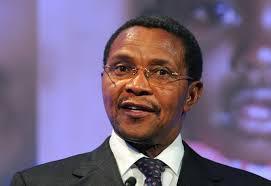
Tanzanian President Jakawa Kikwete whose forces are part of the international brigade of intervention working alongside MONUSCO in Eastern Congo.
President Pierre Nkurunziza is expected to seek a third mandate, and the comment will have reverberated within the region.
TANZANIAN leader Jakaya Kikwete called on Burundi to abide by a peace agreement that limits presidents to two terms in office, amid speculation President Pierre Nkurunziza may seek a third mandate.
“Anyone who wants to be elected must respect Arusha Accords, Burundi’s constitution and election law,” Kikwete told reporters late Thursday in Burundi’s capital, Bujumbura, at the conclusion of a visit to the East African nation.
The accords, named after a city in northern Tanzania, were the result of talks initially facilitated by that country’s former President Julius Nyerere and brought an end to Burundi’s decade-long civil war.
Burundi is scheduled to hold presidential elections in June in which Nkurunziza has said he would seek a third term in office if the ruling party nominated him. As many as 300 civil- society organizations are campaigning against Nkurunziza running, which they say would violate peace agreements.
The Burundi president this week said elections would be peaceful, as he opened an East African Legislative Assembly sitting in the capital Bujumbura.
Nkurunziza, 51, came to power in Burundi in 2005 after leading a faction of the rebel National Council for the Defense of Democracy–Forces for the Defense of Democracy during the civil war that killed 300,000 people.
He would join the leaders of the Democratic Republic of Congo, Benin, Rwanda and Congo-Brazzaville who are thought to be considering constitutional change to allow their leaders a third term in office.
The US last year urged the Burundi government to ensure that upcoming presidential elections are “consistent with the Arusha accords, including its provisions regarding term limits.
African countries tend to invoke sovereignty when questions of term limits are raised, therefore Kikwete’s foray into Burundi’s hot potato issue raises a different prospect altogether for Nkurunzinza.
Angered Rwanda
Tanzania has in recent years maintained a sort of Big Brother relationship with Burundi, and Kikwete’s comments will therefore have been noted in Bujumbura. The two countries have in the past had spats over cross-border rebel attacks.
Burundi’s constitution only allows a president to be elected twice—for a total of 10 years in power—but Nkurunziza argues he has only been directly elected by the people once. For his first term, beginning in 2005, he was selected by parliament.
Kikwete is due to step down at the end of his second term this year, with elections set for October.
In 2013 he angered his other neighbor Rwanda after he suggested Kigali hold talks with rebel group Democratic Forces for the Liberation of Rwanda (FDLR) to help end the conflict in eastern DRC.
Kigali says the rebel group is responsible for the 1994 genocide.
African nations where laws have been changed to the benefit of their incumbent leaders include Algeria, Angola, Chad, Djibouti and Uganda.
This week Senegal president Macky Sall said he would propose a referendum next year that would reduce the country’s presidential term limit to five from seven years.
Source: Mail&Guardian Africa
